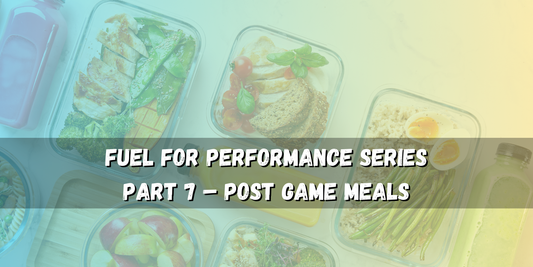Carbohydrates are the primary fuel source for rugby players—but too many athletes still underuse or misunderstand them. When used correctly, carbs help you train longer, sprint harder, and recover faster. When ignored or poorly timed, they leave you gassed out before the final whistle.
In Part 3 of the Fuel for Performance Series, we’re breaking down carbohydrates—how they support high-intensity performance, delay fatigue, and keep you sharp throughout training and games.
Here’s a look at the rest of the series:
- Part 1: Breakfast – Boost Energy & Recovery
-
Part 2: Hydration – Improve Endurance & Delay Fatigue
- Part 4: Fats – Enhance Recovery & Brain Function
- Part 5: Protein – Build Muscle & Repair Tissue
- Part 6: Pre-Game Meals – Maximize Energy & Avoid Fatigue
- Part 7: Post-Game Meals – Rebuild Tissue & Restore Energy
- Part 8: Pre-Workout Meals – Fuel Up & Train Strong
- Part 9: Post-Workout Meals – Recover & Build Strength
Let’s get into it.
WHAT ARE CARBOHYDRATES?
Carbohydrates are one of the three macronutrients (along with protein and fat) that provide the body with energy. When consumed, they are broken down into glucose, which is either used immediately for fuel or stored as glycogen in the muscles and liver for later use.
For rugby players, glycogen is the body’s most efficient energy source, supplying the power needed for sprints, scrums, tackling, and endurance efforts. When glycogen stores are depleted, fatigue sets in, reaction time slows, and overall performance declines.
There are two main types of carbohydrates:
-
Simple Carbohydrates – Fast-digesting carbs that give an immediate energy boost. Found in fruits, honey, and sports drinks, these are useful for pre-game fuel and quick recovery.
- Complex Carbohydrates – Slow-digesting carbs that provide a steady release of energy and essential nutrients. Found in whole grains, starchy vegetables, and legumes, these are ideal for sustained energy throughout training and matches.
Now that we’ve covered what carbohydrates are, let’s dive into why they are essential for rugby players and how to use them effectively.

WHY CARBOHYDRATES MATTER FOR RUGBY PLAYERS
1. Provides Energy for High-Intensity Performance
Rugby is a physically demanding sport that requires explosive power, endurance, and quick bursts of speed. Carbohydrates fuel these efforts, helping players maintain peak performance throughout the match.
When glycogen stores are low, the body struggles to keep up with high-intensity movements, leading to early fatigue and decreased power output.
2. Delays Fatigue and Enhances Endurance
Without enough carbohydrates, the body is forced to rely on fat for energy, which is a much slower and less efficient process. This leads to sluggish movement, decreased endurance, and poor recovery between plays.
Maintaining proper carbohydrate intake prevents energy crashes and keeps players performing at a high level for longer.
3. Supports Muscle Recovery and Growth
Post-match and post-training recovery are just as important as in-game performance. Carbohydrates help replenish glycogen stores, which is crucial for muscle recovery, reducing soreness, and preparing for the next training session.
Pairing carbohydrates with high-quality protein (like PEAK RUGBY BUILD – Whey Protein Isolate) post-training enhances muscle repair and overall recovery.
4. Improves Mental Focus and Decision-Making
Rugby is not just about physical strength—it requires quick decision-making, precise coordination, and strategic thinking. The brain primarily runs on glucose (a form of carbohydrate), and low carbohydrate intake can lead to mental fatigue, slower reaction times, and poor concentration.
Maintaining steady carbohydrate intake ensures that players stay mentally sharp, focused, and ready to react under pressure.
5. Prevents Muscle Breakdown
If glycogen levels are too low, the body starts breaking down muscle protein for energy, leading to muscle loss and reduced strength over time.
By ensuring proper carbohydrate intake, rugby players protect their muscle mass and maintain strength throughout the season.
HOW TO OPTIMIZE CARBOHYDRATE INTAKE
The key to maximizing performance is choosing the right types of carbohydrates at the right times.
1. Prioritize Complex Carbohydrates for Sustained Energy
Complex carbohydrates digest slowly, providing long-lasting energy and preventing blood sugar crashes.
Best complex carbs for rugby players:
- Whole grains (brown rice, quinoa, whole wheat bread, oats)
- Starchy vegetables (sweet potatoes, squash, carrots)
- Legumes (beans, lentils, chickpeas)
- Fruits (bananas, apples, berries)
2. Use Simple Carbohydrates for Quick Energy
Simple carbohydrates are rapidly absorbed, making them ideal for pre-match fuel, halftime refueling, and post-game recovery.
Best simple carbs for quick energy:
- Fruit (bananas, oranges, grapes)
- Honey or maple syrup (great for adding to oatmeal or smoothies)
- Water with Himalayan Salt + Lemon
3. Fuel Before Training and Matches
To maximize energy and delay fatigue, rugby players should eat a carbohydrate-rich meal 2-3 hours before training or a match.
Example pre-game meals:
- Grilled chicken + brown rice + steamed vegetables
- Omelet with whole-grain toast + avocado
- Oatmeal + banana + peanut butter
4. Replenish Glycogen After Training
Post-workout, combining carbohydrates with protein accelerates recovery.
Best post-training recovery meals:
- Lean beef + roasted sweet potatoes + greens
- Whey protein smoothie (PEAK RUGBY BUILD) + banana
- Whole wheat toast + eggs + avocado
5. Adjust Carb Intake Based on Training Load
Carbohydrate needs vary depending on training intensity and duration:
- High training days: 4-6g of carbohydrates per kg of body weight.
- Moderate training days: 3-5g of carbohydrates per kg of body weight.
- Rest days: Lower carb intake but still include quality sources for recovery.
COMMON CARBOHYDRATE MISTAKES TO AVOID
1. Not Eating Enough Carbs
Some athletes under-eat carbohydrates, leading to low energy levels, early fatigue, and muscle loss.
2. Overloading on Processed Carbs
Sugary snacks, white bread, and processed foods cause energy crashes and don’t provide long-lasting fuel. Stick to whole, nutrient-dense carbohydrates instead.
3. Ignoring Carb Timing
Eating carbs at the right time (before and after workouts) makes a significant difference in performance and recovery.
4. Fearing Carbs and Avoiding Them Completely
Low-carb diets may work for some, but rugby players require glycogen stores for explosive movements. Don’t fear carbs—use them wisely to fuel performance.
FINAL THOUGHTS: CARBOHYDRATES ARE YOUR PERFORMANCE FUEL
That wraps up Part 3 of our Fuel for Performance Series. Carbohydrates are the foundation of rugby performance, fueling:
- Speed
- Endurance
- Recovery
How do you structure your carbohydrate intake for rugby performance? Drop a comment below!
If you found this article helpful, don’t forget to:
- Like and share this post with your teammates and fellow rugby fans
- Bookmark the blog to stay updated on the next rounds
- Follow @gopeakrugby on X and Facebook and subscribe to our Youtube Channel for more rugby analysis, match recaps, and insights


















